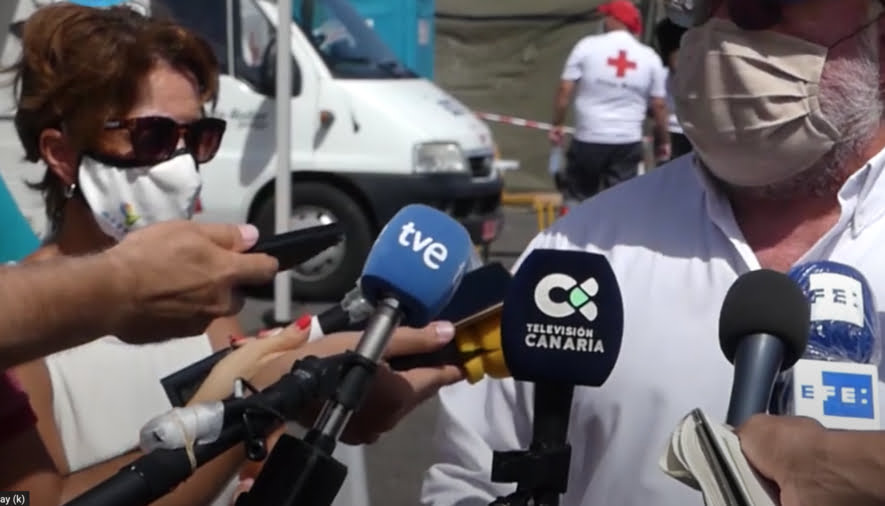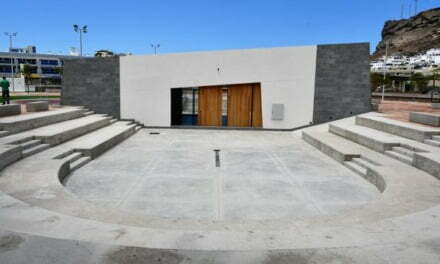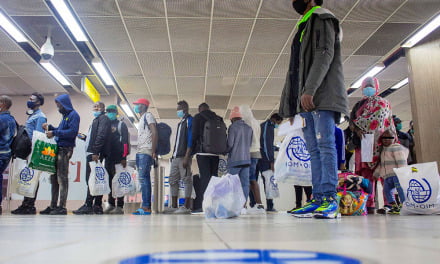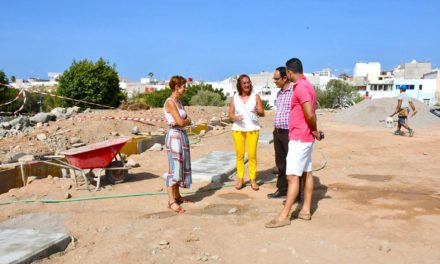A humanitarian crisis has been brewing for more than a year, and now, with a distinct absence of tourism, The Canary Islands have controversially been repurposing some of their hospitality infrastructure, saving jobs and keeping establishments open. Politics is at play.
Over the last weeks and months we have seen growing numbers of the local population expressing fear, anguish and concern towards the occupants of open boats that have been arriving to the Islands from the African continent. This last week we’ve seen visit after visit from politicians; being seen to find solutions.
Without putting too fine a point on it, immigration management is the responsibility of the central government, the Spanish Government Delegation in this regional autonomous community has had at their disposal the collaboration of cabildos and municipal councils, though there has been refusal from some municipal corporations to give up space to properly prepare for the expected scale of what already has the flavour of a humanitarian crisis.
However, when Human Rights professor and magistrate, Arcadio Díaz Tejera, visited the port of Arguineguín last week he laid the blame not with the Government but painted it as a shared error of judgment for every single one of us: “This is a humanitarian issue, the responsibility of all human beings. And between all of us we have allowed rights holders to spend two weeks in bad conditions ”.
 Díaz Tejera was the head of the Las Palmas CIE (centro de internamiento de extranjeros) in Barranco Seco, until the facility closed during the State of Emergency. In his opinion, the problem generated by the overflowing reception network in the Canary Islands, due to the constant arrival of boats and cayucos now “concerns everyone”, so the administrations cannot continue to “hide in the argument that it is not their competence” to circumvent the situation. For this reason, Díaz Tejera denounced “a thunderous silence” resounding from political representatives and public officials in the archipelago, which has made the current situation possible.
Díaz Tejera was the head of the Las Palmas CIE (centro de internamiento de extranjeros) in Barranco Seco, until the facility closed during the State of Emergency. In his opinion, the problem generated by the overflowing reception network in the Canary Islands, due to the constant arrival of boats and cayucos now “concerns everyone”, so the administrations cannot continue to “hide in the argument that it is not their competence” to circumvent the situation. For this reason, Díaz Tejera denounced “a thunderous silence” resounding from political representatives and public officials in the archipelago, which has made the current situation possible.
These “are not the right conditions for a human being”, said the judge, demanding those responsible take charge because “it is not a Canarian problem, but affects an entire continent.” The right to migrate is, he said, “a fundamental right that now seems almost to be a crime” particularly when you have people who may “have saved for years for this trip” and who come from countries like Mali, “war, from which they flee because they seek to survive”.
 President Ángel Víctor Torres of the Canary Islands Regional Government, also traveled down to the south of Gran Canaria last week; as did Social Rights Minister, Noemí Santana, and the delegate of the Government of Spain in the Canary Islands, Anselmo Pestana, all to announce the dismantling of this makeshift reception area, a humanitarian crisis camp of aid tents. The President of Gran Canaria Antonio Morales visited on Saturday.
President Ángel Víctor Torres of the Canary Islands Regional Government, also traveled down to the south of Gran Canaria last week; as did Social Rights Minister, Noemí Santana, and the delegate of the Government of Spain in the Canary Islands, Anselmo Pestana, all to announce the dismantling of this makeshift reception area, a humanitarian crisis camp of aid tents. The President of Gran Canaria Antonio Morales visited on Saturday.
All of this activity followed an unexpected second visit by the mayor of Mogán, apparently to display emotion when mentioning women and children living under the Red Cross canvas. Three days earlier it seemed she was less sympathetic, her first press conference on the dockside had been accompanied by a spokesperson for the Arguineguín Fishermen’s Association expressing anger and fear that the migrants might “expose our elders and our children” to the COVID19 virus. He pointed out that “evacuees from the Gran Canaria fires were not put into any hotel.” and declared that accommodating migrants in this manner would have “a call effect”, as the mayor watched on, without comment, calculating the attitudes of the people. It seemed her change of heart occurred around the same time we discovered the VIPs were coming to show their prowess during a humanitarian crisis.
Spain’s Minister for Inclusion, Social Security and Migration, José Luis Escrivá was supposed to visit during the first week of September, however had to postpone last minute, leaving President Torres plainly expressing discontent over what he called a “sit-in”, stating that what is required is “precise and immediate” solutions to comprehensively address the arrival of migrants in open boats, pateras or cayucos. Minister Escrivá made assurances that he would travel when he had a “sufficiently loose” schedule.
The Secretary of State for Migration had also planned to travel to Gran Canaria this summer for the inauguration of what was to be the Arinaga migrant reception centre, which was intended to accommodate up to 900 people. A project that was finally paralysed due to difficulties in obtaining permits from the Agüimes Town Council.
<<Not on my doorstep>> seems a familiar cry
 The warnings of a humanitarian crisis, should the Atlantic route open up again, started last year. Despite the full resources and backing of the UNHRC United Nations Human Rights Council, local councillors refused to collaborate with the creation of the Arinaga facility, and so the UN teams ended up dismantling their infrastructure, and flying off elsewhere, to somewhere others in need really need their help. It seems Gran Canaria missed its opportunity to be ahead of the migrant crisis.
The warnings of a humanitarian crisis, should the Atlantic route open up again, started last year. Despite the full resources and backing of the UNHRC United Nations Human Rights Council, local councillors refused to collaborate with the creation of the Arinaga facility, and so the UN teams ended up dismantling their infrastructure, and flying off elsewhere, to somewhere others in need really need their help. It seems Gran Canaria missed its opportunity to be ahead of the migrant crisis.
NGOs had started reporting some eleven months ago, October 2019, that there were clear indications of the reactivation of the Canary Islands migration route, they sent stark warnings of the importance of having foresight and preparing a list of available resources. One of the most repeated current criticisms is now directed at the Ministry of Defence, which has so far refused the repurposing of disused sites throughout the Archipelago that could be enabled to host migrants. Torres has asked the central government to open these buildings, as well as the Foreign Interment Centres (centros de internamiento de extranjeros), themselves facilities historically overshadowed by unhappiness, and years of complaints at many sites over insanitary conditions and sometimes brutal regimes. That said Arcadio Díaz Tejera seems he may be just the right guy for that sort of job, the hosting and processing of irregular migrants.
In Mogán the now teary-eyed mayor had demanded increased security at the Arguineguín dock in a press conference to set out her will to prevent the migrants who crowded there from fleeing and hiding anywhere in her municipality, always from the context of a pandemic, followed by a startling outpouring of compassion.
According to data from the Ministry of Health, only four of the 168 active outbreaks in the archipelago have been related to people arriving by boat. So the suggestion of security fears on that basis would appear to be a short lived pathway forward. The caring face of Mogán has much more appeal, and plays to the innate hospitality with which Moganeros, and a large immigrant population, have helped build a thriving tourist industry. Let’s hope more caring solutions can be found.
Meanwhile apartment complexes are assisting the Government of Spain to, at least temporarily, humanely accommodate the true victims in this story, offering a little respite from the coronavirus tourism decline, by keeping their businesses open, to this a new influx of visitors, just seeking somewhere to lay their heads for a while, the worst ravages of the crisis may be avoided, for some. While the tourists are away, at least the migrant crisis pays.










